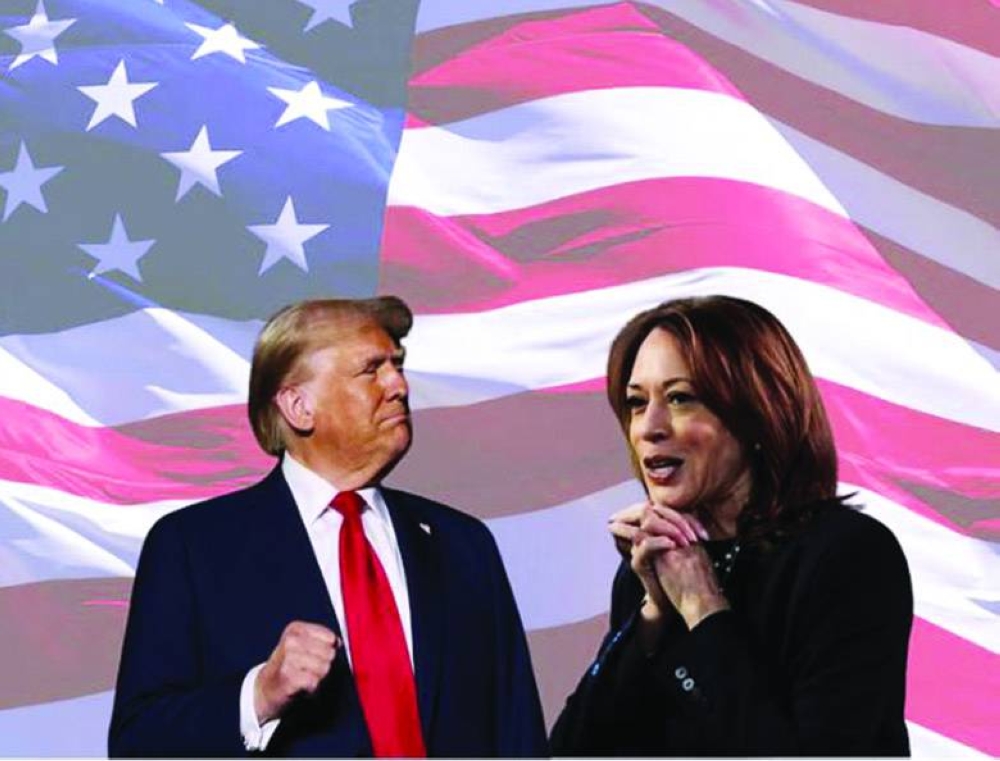Americans face a crucial decision on November 5 as they elect a wartime president. The reality is stark — a significant geopolitical challenge looms with the collaboration of China, Russia, Iran, and North Korea. This axis of aggressors poses unprecedented peril. The candidates are yet to address this pressing issue directly to the American people, and the next president, whether it is former president Donald Trump or Vice-President Kamala Harris, will lead at a pivotal moment in history, comparable to the Cold War or even World War II.
As American voters will be choosing between two different visions of America — and two vastly different visions of what role the country should play in global affairs – the next US president, no matter who it is, will have to contend with major foreign policy challenges, including Russia’s war in Ukraine, the Israel-Hamas conflict in Gaza, the global migrant and refugee crisis, a warming planet, and competition with China. These issues could shape voters’ choices at the ballot box.
Washington Post columnist George F Will draws parallels between the upcoming 2024 US elections and the historical context of the 1940 US elections. According to Will, the current global landscape echoes an era when the US had not yet declared war on major powers like Imperial Japan, Hitler’s Germany, or Mussolini’s Italy. He highlights the expansive theatre of conflicts today, stretching from Russia’s border to the waters where China challenges Philippine sovereignty, spanning six of the world’s 24 time zones. Will aptly labels this scenario as “the gathering storm,” reminiscent of Winston Churchill’s World War II memoir title.
In a recent essay in Foreign Affairs, US Secretary of State Antony Blinken shares insights on the administration’s foreign policy track record and future outlook post-President Joe Biden. Blinken emphasises the critical choices the US must make in the coming years to shape the global landscape. Highlighting the challenges posed by China and Russia, he stresses the importance of strategic decisions in this pivotal decade. Blinken underscores the ongoing efforts of the Biden administration in bolstering America’s position through domestic investments and strengthened alliances. However, he cautions that more work lies ahead to navigate the complexities of international relations successfully. The Secretary of State’s focus on policy over politics underscores the gravity of the decisions that will define the trajectory of the twenty-first century.
As professor of international politics, I underline that the most pressing foreign policy issues facing the US are the intensifying strategic competition with China, managing relations with Russia amid the ongoing Ukraine conflict, re-establishing multilateral co-operation to address global crises, the deteriorating humanitarian crisis in Palestine and Lebanon and navigating the energy and climate crisis. These issues will require a nuanced approach, balancing diplomatic, economic, and military tools.
One of the paramount concerns will be managing relations with China. The US-China relationship has become increasingly adversarial, with both countries locked in competition across technological, economic, and military dimensions. The new administration will have to address concerns over Taiwan, which remains a flashpoint that could escalate into military conflict. Furthermore, China’s expanding influence in regions like the South China Sea, Africa, and Latin America underscores a growing challenge to US global dominance. The US may craft dedicated a grand strategy which focuses on forming coalitions with allies, imposing sanctions on Chinese technology companies, or bolstering Taiwan’s defences. However, finding common ground on issues like climate change and public health will remain necessary to avoid a Cold War-like standoff.
In parallel, the war in Ukraine will continue to shape US foreign policy toward Russia and Europe. While the US has led Nato in supporting Ukraine with military and financial aid, there are concerns about sustaining this level of support. As the conflict drags on, European allies may press the US for a more negotiated solution. The new US administration will also have to carefully navigate sanctions on Russia to avoid adverse impacts on the global economy. Balancing these efforts will require the new administration to reinforce transatlantic solidarity, not only to counter Russia but also to send a signal to certain regimes worldwide that sovereignty and democratic principles are non-negotiable.
The need for effective multilateralism is another key issue. The new administration will inherit a world grappling with transnational problems such as global health threats, nuclear proliferation, and the ongoing humanitarian crises in places including Palestine, Lebanon and Afghanistan. To address these, the US will need to engage more robustly with international organisations like the UN, World Health Organisation, and the World Trade Organisation. The so-called Global South has voiced dissatisfaction with Western dominance in these institutions, calling for reforms that would allow for a more equitable distribution of power. If the US ignores these calls, the new administration risks losing influence among emerging powers that are increasingly leaning toward multipolarity.
In fact, amid escalating Israeli airstrikes and the growing civilian casualties, the new US administration will need to strike the balance between its continued support to Israel and its humanitarian obligations for strategic alliances and regional stability. Historically, US foreign policy tends to favour a multilateral approach in engaging with regional players and non-governmental organisations including the UN. Its conventional approach underlines the importance of upholding international law. However, I contend that the new US administration will inherit a complex, protracted regional situation whose would serve as a litmus test for the US commitment to global human rights, testing whether the US can evolve beyond historical precedents to prioritise civilian protection in Palestine and Lebanon.
Last but not least, the intersection of the climate crisis and energy security will demand urgent attention. The new administration will need to balance short-term energy needs, especially in light of energy supply disruptions from the Russia-Ukraine conflict, with long-term climate commitments. The Inflation Reduction Act of 2022 marked a significant step in transitioning the US toward renewable energy, but effective implementation will require continued diplomatic coordination with other major polluters like China and India. Additionally, extreme weather events will likely exacerbate global instability, creating more migration crises that the US must anticipate and address.
As we eagerly await who the new US President will become, his or her new administration will face a set of interlocking foreign policy challenges, each demanding a careful and adaptive strategy. Navigating these issues will require not only ally-based, pragmatic resolutions but also a broader vision of America’s role in a rapidly changing world. The ability of the US to respond will significantly shape global stability, alliances, and the effectiveness of international cooperation in the coming decade.
lThe author is an Associate Professor of International Relations and Diplomacy, the co-founder and chairman, American Center for Strategic and International Affairs, and an Abshire-Inamori International Fellow. Social media platforms:
@khalid.aljufairi (instagram) and @khalidaljufairi (X platform)

Prof Dr Khalid al-Jufairi

Republican presidential candidate Donald Trump (left) and his Democratic rival Kamala Harris. (Reuters)
